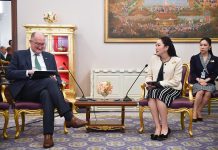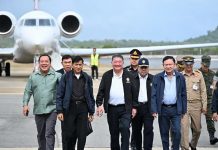Jakarta, Nov 4 – Marine Affairs and Fisheries Minister Susi Pudjiastuti has vowed to step up efforts to curb illegal fishing in Indonesian waters, which has caused losses worth trillions of rupiah to the state and disadvantaged traditional fishermen.
The minister stated that foreign vessels have continued to conduct illegal fishing activities in Indonesian maritime territories such as in the waters of Maluku, Sumatra, and the Indian Ocean. She expressed regret on the rampant illegal fishing practices occurring in Indonesian waters and called on Indonesian fishing businesses to become more self-reliant.
“Do you not want to become independent in your own waters? Why should any foreigner take advantage of it (Indonesias sea resources),” she noted on Sunday.
She had previously pledged to take action against those involved in illegal fishing practices in Indonesian waters. The minister expressed her commitment to crack down upon illegal fishing activities as it harmed the interests and reduced the income of the state.
In a bid to fight this menace and to eliminate instruments disadvantaging the nation, the minister plans to amend regulations in the marine and fisheries sector, among several others.
“I want to revise many ministerial regulations. The president has allowed us to go ahead with the amendments. All can be revised to make it better,” Susi Pudjiastuti remarked after a meeting with President Joko Widodo, or Jokowi, last Friday.
She explained that the regulations to undergo revision included the one concerning the loading and unloading of ships at sea, along with changes in the tariff charged for permits given to ships for conducting fishing in Indonesian waters.
The Peoples Coalition for Fishery Justice (Kiara) had earlier urged the marine and fishery minister to revise several regulations that were hindering the development of the marine and fisheries sector.
“Revise the policy that allows foreigners to take control of the coastal areas and small islands,” Coalition secretary general Abdul Halim pointed out.
Halim sought for the revision of Ministerial Regulation Number 26 of 2013 on Sea Fishing in order to make it more beneficial for the local fishermen.
In this regard, the minister revealed that President Jokowi had urged her to continue carrying out improvements in the marine affairs and fisheries sector, so that it can reap benefits for the people and reduce losses incurred by the state.
The state has suffered losses from poaching, the abuse of licenses, and policies that benefit large fishing trawlers such as the fuel subsidy offered to vessels with a capacity of over 30 deadweight tonnage.
Besides that, the government is also imposing a moratorium on issuing fishing licenses for large trawlers. She said her ministry would impose a moratorium on the issuance of licenses for large fishing trawlers in 2014.
“I want a moratorium on licenses issued for big fishing trawlers until the end of 2014,” she stated at a meeting earlier with members of the Indonesian Chamber of Commerce and Industry.
“The plan of the minister for marine affairs and fisheries to impose a moratorium must be followed up with efforts to eliminate illegal fishing in the countrys waters,” Riza Damanik, the advisory board chairman of the Indonesian Traditional Fishermen Association (KNTI), noted on Sunday.
According to Kiara, the state lost Rp101 trillion to illegal fishing activities between January and August 2014, during which a total of 1.6 million tons were illegally fished from Indonesian waters.
Most of the foreign fishing boats that poached in Indonesian waters came from Vietnam, Malaysia, Thailand, the Philippines, Taiwan, Hong Kong, and China, according to Selamet Daroyni of Kiara.
Riza Damanik explained that the crackdown on illegal fishing in Indonesian waters could be carried out by checking the licenses of fishing boats that were previously owned by foreigners.
He said that although they have obtained a license from the Ministry of Marine Affairs and Fisheries, some of the former foreign ships are still being operated by foreign crew.
The other step to curtail illegal fishing in Indonesia waters is to review the deadweight tonnage of the ships to see whether the tonnage complies with that declared in the license.
“From here, under-reported tonnage, the volume of fish caught, and fuel leakage could be recorded,” he pointed out.
The government is also planning to lift fuel subsidy for large fishing trawlers with deadweight of over 30 Gross Tonnage (GT).
“It is obvious that the state suffers about Rp11 trillion worth losses,” Minister Susi Pudjiastuti remarked.
She explained that the figure was derived from the calculation of 5,329 ships with deadweight of over 30 GT, which had procured licenses from the marine affairs and fisheries ministry.
It is believed that the government spent some Rp11.5 trillion in subsidy on the fishery industry, while its non-tax revenues from the ships was only some Rp300 billion.
Therefore, according to the minister, revenues and spending on the subsidy for them were not balanced.
She said she had passed an instruction to revise the fuel subsidy regulation on fishing vessels to restore the balance. The state should have much larger revenue in the form of taxes from the fishing vessels that use subsidized fuel in Indonesia.
However, the policy of lifting fuel oil subsidy should not be imposed on ships with deadweight of less than 30 GT as small fishermen, who are often marginalized, so far, use ships with a tonnage size below 30 GT.
“The government may not eliminate fuel subsidy for small fishermen,” Riza Damanik reported on Sunday.
He noted that his side supported the governments plan to lift the subsidy for large fishing trawlers with a deadweight tonnage of over 30 GT. Yet, he did not agree with it if the subsidy for ships below 30 GT, which were often used by small or traditional fishermen, was also abolished.
In the meantime, Secretary General of Kiara Abdul Halim has urged the government to improve the welfare of fishermen.
“Efforts to improve their prosperity must be maximized,” he noted.
He pointed that there is bound to be increased optimism if the Coordinating Minister for Maritime affairs Indroyono Susilo and the Marine Affairs and Fisheries Minister Susi Pudjiastuti worked for the welfare of the fishermen.
Abdul Halim expressed hope that the two ministers will not be swayed by foreign interests. Over the past decade, the interests of the nation had often been overlooked in favor of foreign parties.
“Our main concern is that if the officials fail to differentiate between the interests of the nation and their personal interests, and more importantly, the interests of foreigners,” Abdul Halim added.




